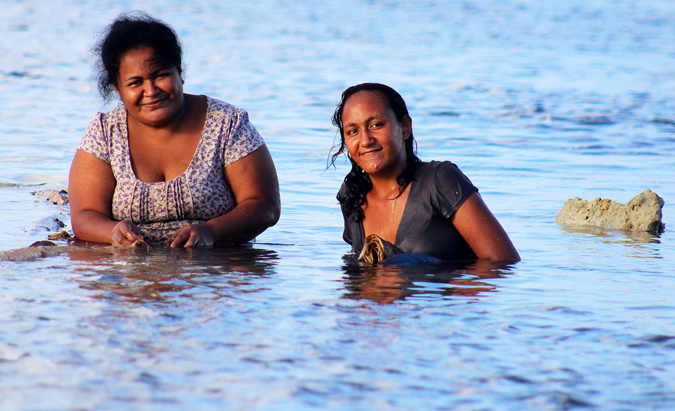UN agencies welcome Tonga’s decision to ratify CEDAW
Date:
Joint Media Statement
UN Women and
Office of the High Commissioner for Human Rights (OHCHR), Regional Office for the Pacific
Suva, Fiji - UN Women and the Regional UN Human Rights Office for the Pacific welcome the Government of Tonga’s agreement to ratify the United Nations Convention on the Elimination of all forms of Discrimination against Women (CEDAW).
CEDAW is the principal UN treaty on women’s human rights. It was adopted by the UN General Assembly in 1979 and has so far been ratified by 188 countries. Any State that ratifies the convention is legally bound to eliminate discriminatory practices against women and girls and incorporate gender equality into law.
The agreement of Tonga to ratify CEDAW comes on the eve of the 20th anniversary of the Beijing Declaration and Platform for Action, the most progressive blueprint for achieving gender equality and the focus of the 59th Commission on the Status of Women currently being held in New York.

In the lead-up to the adoption to the new Sustainable Development Goals, which will replace the Millennium Development Goals from September this year, UN Women has launched the Planet 50-50 by 2030: Step it Up for Gender Equality campaign. This campaign calls on all governments to make concrete commitments towards achieving gender equality by 2030.
“If we are to truly end gender inequality in the Pacific by 2030, we need to see urgent and concrete action from leaders across the region. This commitment from the Tongan Government is exactly the kind of progress we need to see and that the ‘Step it Up’ campaign is calling for,” says Nicolas Burniat, Deputy Representative and Officer in Charge of UN Women’s Fiji Multi-Country Office.
“Tonga’s decision to ratify CEDAW is an important step towards ending discrimination against women in the Pacific,” says Satya Jennings, Officer in Charge of the Regional UN Human Rights Office for the Pacific.
“It is encouraging that, with Tonga, all but one of the Pacific Island States and territories will have ratified CEDAW. Once Tonga has undergone the actual ratification process, the focus will need to be on effective implementation of the human rights treaty, for example by bringing national legislation in line with international standards.”
UN Women and the UN Human Rights Office continue their work to support Pacific States in achieving gender equality and ending discrimination against women.
For further information please visit:
asiapacific.unwomen.org/en/countries/fiji
www.facebook.com/unwomenpacific
www.ohchr.org
www.facebook.com/UNHumanRightsPacific
Media enquiries should be directed to:
Ellie van Baaren
Regional communications and media specialist
UN Women
Suva, Fiji
Phone: (+679) 330 1178 ext 125
Email: [ Click to reveal ]
Office of the High Commissioner for Human Rights, Regional Office for the Pacific
Suva, Fiji
Phone: (+679) 331 0465 ext 208
Email: [ Click to reveal ]
BACKGROUND INFORMATION
About UN Women and the Multi-Country Office (MCO) in Fiji
The United Nations Entity for Gender Equality and the Empowerment of Women (UN Women) was created at the July 2010 United Nations General Assembly. A global champion for women and girls, UN Women was established to accelerate progress on meeting their needs worldwide. The MCO covers 14 Pacific Island Countries and Territories (PICTs): Cook Islands, Federated States of Micronesia, Fiji, Kiribati, Nauru, Niue, Palau, Republic of Marshall Islands, Samoa, Solomon Islands, Tokelau, Tonga, Tuvalu and Vanuatu. The Fiji MCO works with four key programmes: Women’s Economic Empowerment; Ending Violence Against Women; Advancing Gender Justice in the Pacific; and Increasing Community Resilience through Empowerment of Women to Address Climate Change and Natural Hazards Programme to progress with gender equality and women’s empowerment in the Pacific.
About the Office of the High Commissioner for Human Rights, Regional Office for the Pacific, Suva, Fiji
The Office of the High Commissioner for Human Rights (OHCHR) has a unique mandate from the international community to promote and protect all human rights across the world since 1993. The OHCHR Regional Office for the Pacific covers 16 countries: Australia, Cook Islands, Federated States of Micronesia, Fiji, Kiribati, Nauru, New Zealand, Niue, Palau, Papua New Guinea, Republic of the Marshall Islands, Samoa, Solomon Islands, Tonga, Tuvalu and Vanuatu. OHCHR promotes and protects human rights in the Pacific through advocacy and awareness raising; monitoring, documenting and reporting on human rights violations; and by providing expert advice and technical assistance to governments, regional organizations and civil society.